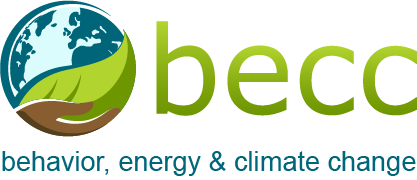Reimagining Creativity; Inspiring Behavior Change
Moderator: Marda Kirn, EcoArts Connections
Monday, 1:15 EST pm, 10:15 PST am
Images and storytelling are increasingly used to improve climate change communication‚ often without realizing or remembering that the arts are a source for these tools. Other helpful arts tools include “inviting people in” instead of “pushing information out” to inspire attitude and behavior change successfully. Hear ways you might ally with the arts to more efficiently and effectively shift people from awareness to action.
Panelists:
- Eve Mosher, Artist
- Xavier Cortada, Artist and Professor of Practice at the University of Miami Department of Art and Art History
~~~~~~~~~~~~~~~~~~~~~~~~~~~~~~~~~~~~~
Future Framing: Considering the Future Today for Tomorrow
Moderator: Katelyn Stenger, University of Virginia
Monday, 2:30 EST pm, 11:30 PST am
Why should we envision the future of climate change? What works? Framing present situations in the future can be a powerful tool in addressing climate change by revealing various pathways to action. Panelists will discuss research investigating how framing decisions about the future influences climate action, applications that align short-term action with long-term climate goals, and how we can expand who envisions these futures.
Panelists
- Dr. Elke Weber, Princeton University
- Krystel Montpetit, OECD
- Vanessa Keith, Principal Architect of Studioteka
- Patrick Hancock, University of Virginia
~~~~~~~~~~~~~~~~~~~~~~~~~~~~~~~~~~~~~
How Should We Talk About Climate Change to Motivate Behavior Change? New Insights from Social Science
Moderator: Cynthia Frantz, Oberlin College
Tuesday, Noon EST, 9:00 PST am
How we talk about climate change—and its solutions—matters for policy support and behavior. Panel members will briefly present new psychological research on 1) focusing on the collective nature of climate change, 2) thinking about the future, 3) emphasizing structural change, and 4) a bipartisan vision of decarbonization. Presentations will be followed by a solutions-focused discussion among all attendees about how to use these findings best.
Panelists:
- Min Suh, University of Massachusetts, Amherst
- Joel Ginn, University of Massachusetts, Amherst
- Deidra Miniard, Indiana University
~~~~~~~~~~~~~~~~~~~~~~~~~~~~~~~~~~~~~
How to Reach the Hard-to-Reach Around the World
Moderator: Sea Rotmann, Users Technology Collaboration Program by International Energy Agency
Tuesday, 1:15 EST pm, 10:15 PST am
An international research collaboration investigated hard-to-reach (HTR) audiences in the residential and non-residential sectors, focusing on five countries (United States/Canada, New Zealand, Sweden, and the United Kingdom). We found this audience to include over 50% of energy users – and it is rising fast due to COVID-19. This session will provide insights into the HTR in different parts of the world, their broader contexts and barriers, and why we need to work harder to engage them.
Panelists:
- Aimee Ambrose, Sheffield Hallam University
- Kim O’Sullivan, National Expert – New Zealand
- Raúl Castaño-Rosa, University Carlos III de Madrid
~~~~~~~~~~~~~~~~~~~~~~~~~~~~~~~~~~~~~
Energy Behavior with Smart Thermostats: Reduced Energy and Improved Comfort
Moderator: Therese Peffer, University of California, Berkeley
Tuesday, 3:30 EST pm, 12:30 PST pm
The panelists will explore findings from several field evaluations of smart thermostats in low-income and senior households. They will discuss new design concepts, installation and operation barriers, typical issues (e.g., language), and tested interventions. Their research demonstrates which types of motivations the users need to reduce energy and if it requires tailored applications that consider gamification and serious game techniques to engage the user to reduce energy consumption.
Panelists:
- Sarah Outcault, University of California, Davis
- Juana Isabel Mendez, Monterrey Institute of Technology and Higher Studies
- Will Baker, Google
~~~~~~~~~~~~~~~~~~~~~~~~~~~~~~~~~~~~~
Behavioral Strategies and Deep Measures—Enemies or Friends?
Moderator: Mary Sprayregen, Oracle/Opower
Wednesday, Noon EST pm, 9:00 PST am
Many states are looking to leverage energy efficiency to meet aggressive GHG reduction goals. But which approaches work best? Can changing human behavior drive significant emissions reductions, or do states need to focus on the built environment? New research and program approaches help illuminate the answer: We must do both. And even better: The two combined are greater than the sum of their parts.
Panelists:
- Chris Porter, National Grid
- Andy Frank, Sealed
~~~~~~~~~~~~~~~~~~~~~~~~~~~~~~~~~~~~~
Meeting the Call: Decision-making and Demand Response
Moderator: Margaret Taylor, Lawrence Berkeley National Laboratory (LBNL) and Stanford University’s Precourt Energy Efficiency Center
Wednesday, 1:15 EST pm, 10:15 PST am
This session focuses on the residential, commercial, industrial, and agricultural decision-making needed to unlock the potential of demand response (DR) to balance deeply renewable grids. Panel members will discuss (1) enrollment and participation assumptions underlying the modeling of DR potential; (2) commercial building participation planning that incorporates operator and occupant preferences; and (3) sub-daily, intra-annual, and interannual visions for aligning farm irrigation with climate change adaptation and grid needs.
Panelists:
- Brian Gerke, Lawrence Berkeley National Laboratory
- Jeffrey Deason, Lawrence Berkeley National Laboratory
- Jingjing Zhang, Lawrence Berkeley National Laboratory
~~~~~~~~~~~~~~~~~~~~~~~~~~~~~~~~~~~~~
Maximizing Energy Savings and Mitigating Climate Change through Building Policies and Programs
Moderator: Adam Guzzo, US Department of Energy, Office of Energy Efficiency & Renewable Energy
Thursday, Noon EST, 9:00 PST am
Cities are implementing innovative policies and programs to save energy and reduce emissions in the building sector. Local leaders will share successful strategies, discuss lessons learned, and talk next steps as they work to implement these policies and programs in their communities. Participants will also get a preview of the Department of Energy’s State and Local Planning for Energy (SLOPE) Platform, a tool to enable more data-driven energy planning and decision making.
Panelists:
- Nicole Ballinger, Buildings & Energy Strategic Advisor, Seattle Office of Sustainability & Environment
- Rajiv Ravulapati, GPRO: O&M, Government Services Analyst, the City of St. Louis
